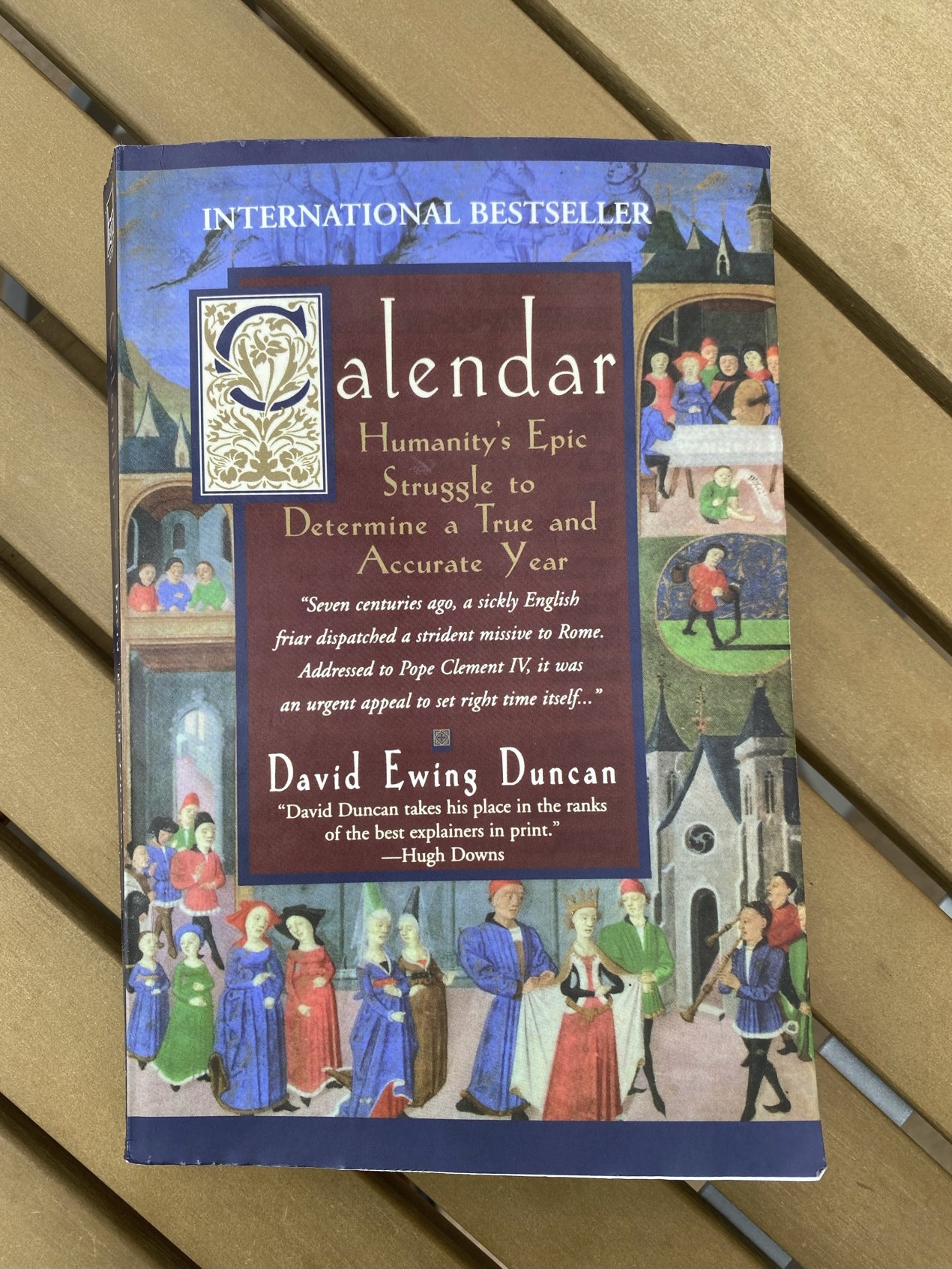Book Review: Calendar – Humanity’s Epic struggle to Determine a True and Accurate Year
David Ewing Duncan
I am not sure who had referred me to this book, but it was in the comment section of some other Book Review I had written. Unfortunately, this book is not available in the digital format. I got the paper version, but since I do not often carry a book with me, I never got around to actually reading this. Till now.
A fascinating book on how we came up with calendars. The numerous mistakes, the number of lives lost (yes, just because of calendar design), the arbitrary dropping of dates in calendar (different countries did in different times) all make for a great read. The author narrates this more as a history lesson than anything else. And he does a great job.
He starts almost on a philosophical note when he talks about how today, we are constantly looking backward and forward in time but never contented with the present. In a way that our ancestors who tilled fields and lived and died according to the great cycles of nature would have never comprehended.
The story he takes us thru starts with the Cro-Magnon man. One of whom would have realized the curious nature of how the moon every night changed and came back to the same position ever so often (about 29 days) as evidenced in bones with telling marks from those days. And thus, almost all calendar journeys for us started with the moon and lunar calendars. Even to this date, lunar calendars are followed in many parts of the world (including my own Bengali calendar – which has been later adapted to take into account the sun’s movement).
Later, the need to take into account the “seasons” came in – especially as farming and harvesting became more prevalent. And that started the eternal struggle to figure out how to calculate a calendar year. Because any which way we divided the cycle of seasons (about 365 days and change) it could never fit well within an integral number of cycles of the moon (about 29 days and change). The resultant was that for the most of the our known human history, our seasons and equinoxes and all that never came “on time”. We were always in error.
The Babylonians, who were very good in astronomy compromised with a “lunisolar” year but it was the Egyptians that truly embraced the sun and ditched the moon to fix the “year”. They Mayans came up with an even more complicated calendar (it was a three calendar system). The Egyptians had figured out that there was another quarter day after 365 to make it a full year but they ignored it for the most part.
The Romans, in the meanwhile, were a mess. It was Caesar who after coming to help Cleopatra got to know about the Egyptian system and then more or less bulldozed a far more modern system in the Roman empire. Which continued for a fairly long time.
Eventually, biggest need for time accuracy that the West felt was the Easter date. The most sacred date at that point of time, celebrations of the same would have been blasphemy if it did not happen on the right date. Ironically, the calendar then was somewhat of a “secret” with the church having a stranglehold on it and they would announce dates often abruptly. Sometimes to favor themselves or kings they liked.
It was Constantine who gave the next big thrust to fixing a calendar year with the great conference in Nicaea that more or less standardized the calculation of the Easter day. It was a fairly onerous task involving nearly 15 equations.
Then came a long period of decline of the Church, the Roman Empire and the West in general. Meanwhile, Islam started their own calendar and the fact that the Indian and Chinese had their own calendars (all mostly moon based) came to the fore as knowledge of other lands started gaining a stronghold in the West.
While Aryabhata from India was a big influence in how the calendar eventually shaped up, the Indian civilizations biggest contribution to the calendar was possibly cracking the positional system. Like 365 means 3 hundreds, 6 tens and 5 unit. It seems so natural now – but imagine the world before that. Just think about the Roman numerals that we are so familiar with. Here is a paradox – even though the Indians knew and depicted fractions (one number up, one number down) – it is not known why they never cracked the decimal system (which is also positional) to represent fractions.
Interestingly, that simple twist delayed the calendar year determination. Basically, we did not know how to represent what we already knew (couldn’t write fractions !!). The Arabs cracked that problem and then they get the credit for calculating a year to the greatest accuracy in those days (12 digits after the decimal). The Europeans did not care about the importance of this “slip”. Incidentally, the person who calculated this is Omar Khayyam. Most of us in the West think of him as the brilliant poet. He was much more.
In the West, the Church continued to thwart efforts by others like Copernicus, Galileo to scientifically fix the year in what can be described as the Dark Ages of the Calendar. Eventually, Pope Gregory XIII called a Niceae style conference to resolve the Easter date once and for all. The person who gets full credit for solving the calendar problem finally is one doctor called Aloysius Lilius who was not even alive when the conference took place. His brother presented his case – with a lot of support from Clavius.
Just because this Gegorian calendar was enacted in 1582 does not mean everybody adopted it. The Protestant countries simply refused to, as an example – for no other reason than that it was done by the Catholic Pope! But the other reason was that this change involved dropping 10 days from the calendar to make adjustments to prior errors. Politicians, true to their colors, often used this to confuse the masses who were completely irate that somebody was “stealing 10 days of their lives”. England waited nearly 150 years! Japan adopted in 1873! Russia in 1918 !! China in 1949 !
And then in 1972, we switched to following the oscillations of a Caesium atom to determine a year (about 3 million trillion oscillations) for accuracy – and sometimes in a year adjust the clock by a second to take into account the variations in earth’s speed and tilt. But for the common man, we stay with the 365 days, one leap day every four years, but no leap day on the century year unless it is divisible by 400, in which case, we will have a leap day. For the most part, this will work out for the next 3 thousand years.
Two thumbs up! If anybody in Atlanta wants it, you can borrow my copy. (Too many highlighter marked passages though)










